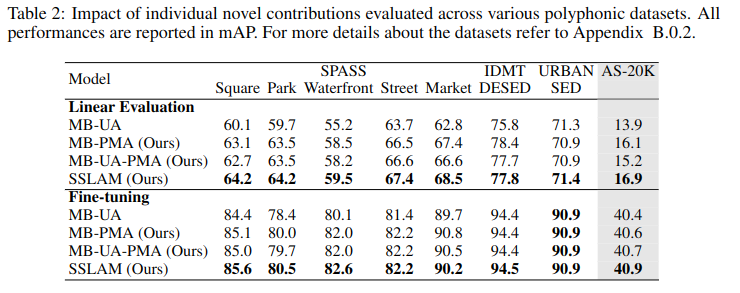license: mit
datasets:
- agkphysics/AudioSet
language:
- en
pipeline_tag: audio-classification
library_name: fairseq
tags:
- self-supervised-learning
- audio-self-supervised-learning
- SSL
- AudioSet
- AudioSSL
- AudioEncoder
🔊 [ICLR 2025] SSLAM: Enhancing Self-Supervised Models with Audio Mixtures for Polyphonic Soundscapes
🚀 SSLAM is a self-supervised learning framework designed to enhance audio representation quality for both polyphonic(multiple overlapping sounds) and monophonic soundscapes. Unlike traditional SSL models that focus on monophonic data, SSLAM introduces a novel source retention loss and audio mixture training, significantly improving performance on real-world polyphonic audio.
🔗 Github | Paper | Open Review |🤗 Models | Models(Google Drive)
📋 Table of Contents
🔍Why SSLAM?
🔊 Real-world audio is polyphonic—multiple overlapping sound sources are common in everyday environments.
❌ Existing SSL models focus on monophonic audio, limiting their ability to generalize to real-world scenarios. Their benchmarks are primarily monophonic, and their pre-training does not account for polyphonic environments.
💡 SSLAM bridges this gap by introducing self-supervised learning from audio mixtures, enabling robust learning across both monophonic and polyphonic soundscapes.
🎼Key Features
✅ Self-Supervised Learning from Audio Mixtures (SSLAM) – improving robustness to real-world polyphonic audio (multiple overlapping sounds).
✅ Source Retention Loss – ensures the integrity of each sound source even in complex mixtures.
✅ SOTA Performance – Achieves +3.9% mAP improvement on AudioSet-2M and +9.1% on polyphonic datasets.
📊Results
1. Standard Audio-SSL Benchmark Datasets
2. Polyphonic Datasets
🔍️Inference Mode
Note: If you are already using EAT in your evaluation/inference pipeline, you can simply replace the weights with SSLAM weights, as the inference and evaluation code is identical to EAT.
If not, follow the steps below for installation:
📥Inference Installation
conda create --prefix /path/to/sslam_eval_env -y python=3.9.13
/path/to/sslam_eval_env/bin/python -m pip install pip==24.0 # downgrade pip
##clone SSLAM
git clone https://github.com/ta012/SSLAM.git
cd SSLAM/
/path/to/sslam_eval_env/bin/pip install -r SSLAM_Inference/requirements_sslam_eval.txt
🚀Using SSLAM
We provide scripts to use SSLAM in the following ways:
1. Audio Feature (Representation) Extraction Using SSLAM Encoder
cd SSLAM_Inference/scripts
bash feature_extract.sh
2. Inference on Single Audio WAV File
cd SSLAM_Inference/scripts
bash inference.sh
3. Evaluation on AudioSet-2M Evaluation Set
cd SSLAM_Inference/scripts
bash evaluate_AS2M_finetuned.sh # Reported mAP: 50.2
🙏Acknowledgements
Our code is primarily based on EAT and data2vec 2.0 with additional concepts and components adapted from AudioMAE.
📜Citation
If you find our work useful, please cite it as:
@inproceedings{alex2025sslam,
title={{SSLAM}: Enhancing Self-Supervised Models with Audio Mixtures for Polyphonic Soundscapes},
author={Tony Alex and Sara Atito and Armin Mustafa and Muhammad Awais and Philip J B Jackson},
booktitle={The Thirteenth International Conference on Learning Representations},
year={2025},
url={https://openreview.net/forum?id=odU59TxdiB}
}


